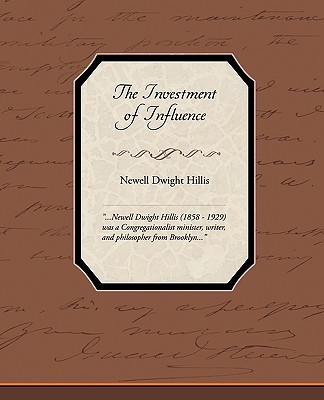
- We will send in 10–14 business days.
- Author: Newell Dwight Hillis
- Publisher: Book Jungle
- Year: 2010
- Pages: 146
- ISBN-10: 1438595271
- ISBN-13: 9781438595276
- Format: 19.1 x 23.5 x 0.8 cm, minkšti viršeliai
- Language: English
- SAVE -10% with code: EXTRA
Reviews
Description
Newell Dwight Hillis (1858 - 1929) was a Congregationalist minister, writer, and philosopher from Brooklyn. As a minister in a major metropolis, Hillis railed against immorality, and he told reporters in 1900 that "a common whipping post might be very wholesome for New York today. The Investment of Influence: A Study of Social Sympathy and Service was first published in 1897. The forward reads, "The glory of our fathers was their emphasis of the principle of self-care and self-culture. Finding that he who first made the most of himself was best fitted to make something of others, the teachers of yesterday unceasingly plied men with motives of personal responsibility. Influenced by the former generation, our age has organized the principle of individualism into its home, its school, its market-place and forum. By reason of the increase in gold, books, travel and personal luxuries, some now feel that selfness is beginning to degenerate into selfishness. The time, therefore, seems to have fully come when the principle of self-care should receive its complement through the principle of care for others. These chapters assert the debt of wealth to poverty, the debt of wisdom to ignorance, the debt of strength to weakness. If "A Man's Value to Society" affirms the duty of self-culture and character, these studies emphasize the law of social sympathy and social service."
EXTRA 10 % discount with code: EXTRA
The promotion ends in 23d.16:27:52
The discount code is valid when purchasing from 10 €. Discounts do not stack.
- Author: Newell Dwight Hillis
- Publisher: Book Jungle
- Year: 2010
- Pages: 146
- ISBN-10: 1438595271
- ISBN-13: 9781438595276
- Format: 19.1 x 23.5 x 0.8 cm, minkšti viršeliai
- Language: English English
Newell Dwight Hillis (1858 - 1929) was a Congregationalist minister, writer, and philosopher from Brooklyn. As a minister in a major metropolis, Hillis railed against immorality, and he told reporters in 1900 that "a common whipping post might be very wholesome for New York today. The Investment of Influence: A Study of Social Sympathy and Service was first published in 1897. The forward reads, "The glory of our fathers was their emphasis of the principle of self-care and self-culture. Finding that he who first made the most of himself was best fitted to make something of others, the teachers of yesterday unceasingly plied men with motives of personal responsibility. Influenced by the former generation, our age has organized the principle of individualism into its home, its school, its market-place and forum. By reason of the increase in gold, books, travel and personal luxuries, some now feel that selfness is beginning to degenerate into selfishness. The time, therefore, seems to have fully come when the principle of self-care should receive its complement through the principle of care for others. These chapters assert the debt of wealth to poverty, the debt of wisdom to ignorance, the debt of strength to weakness. If "A Man's Value to Society" affirms the duty of self-culture and character, these studies emphasize the law of social sympathy and social service."


Reviews